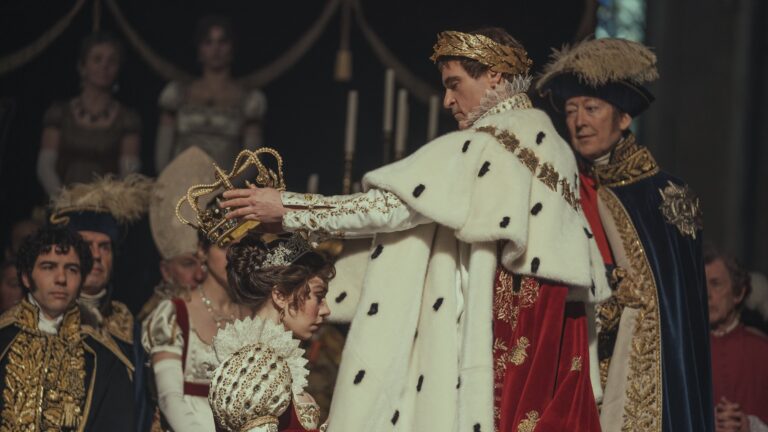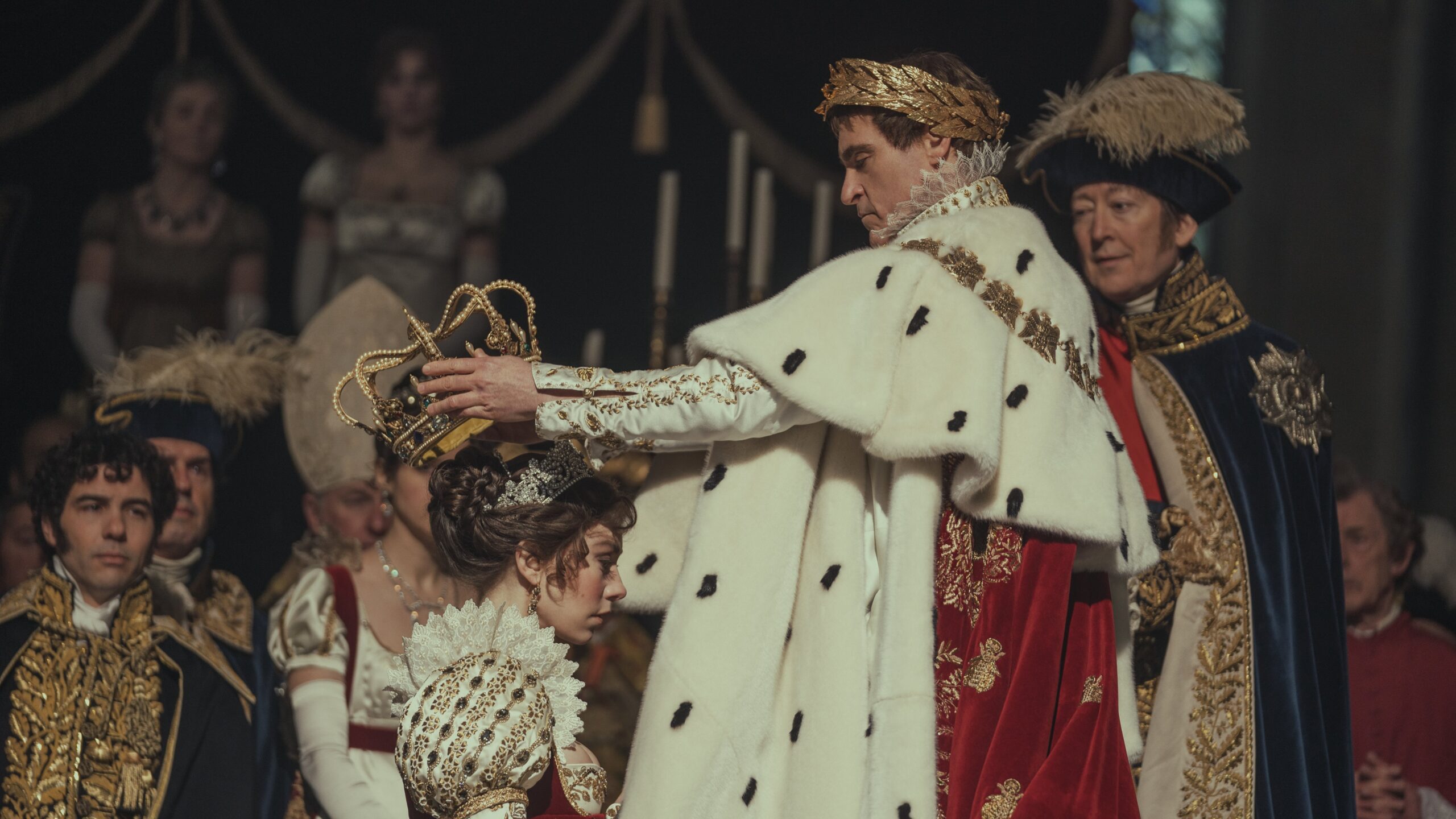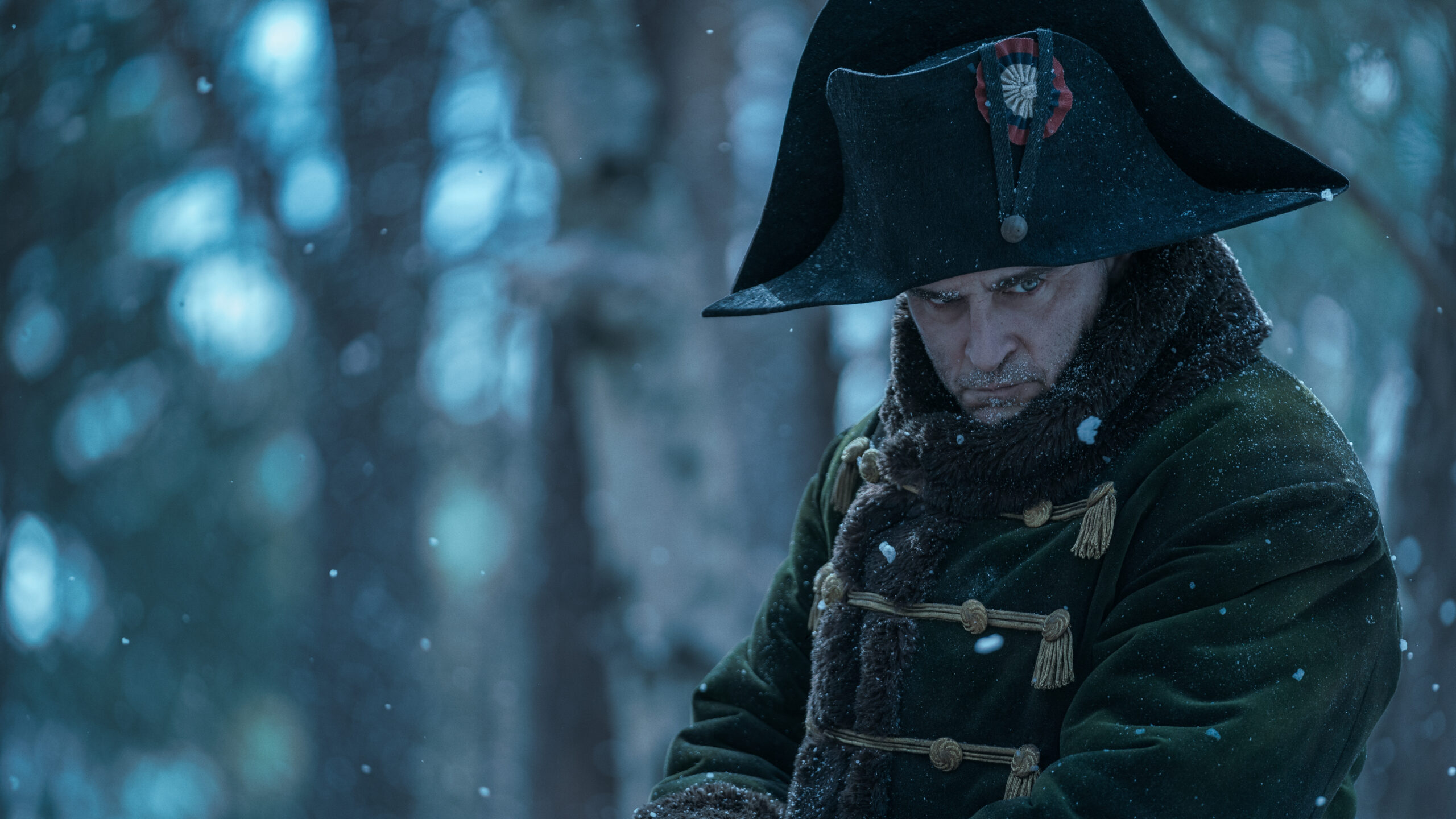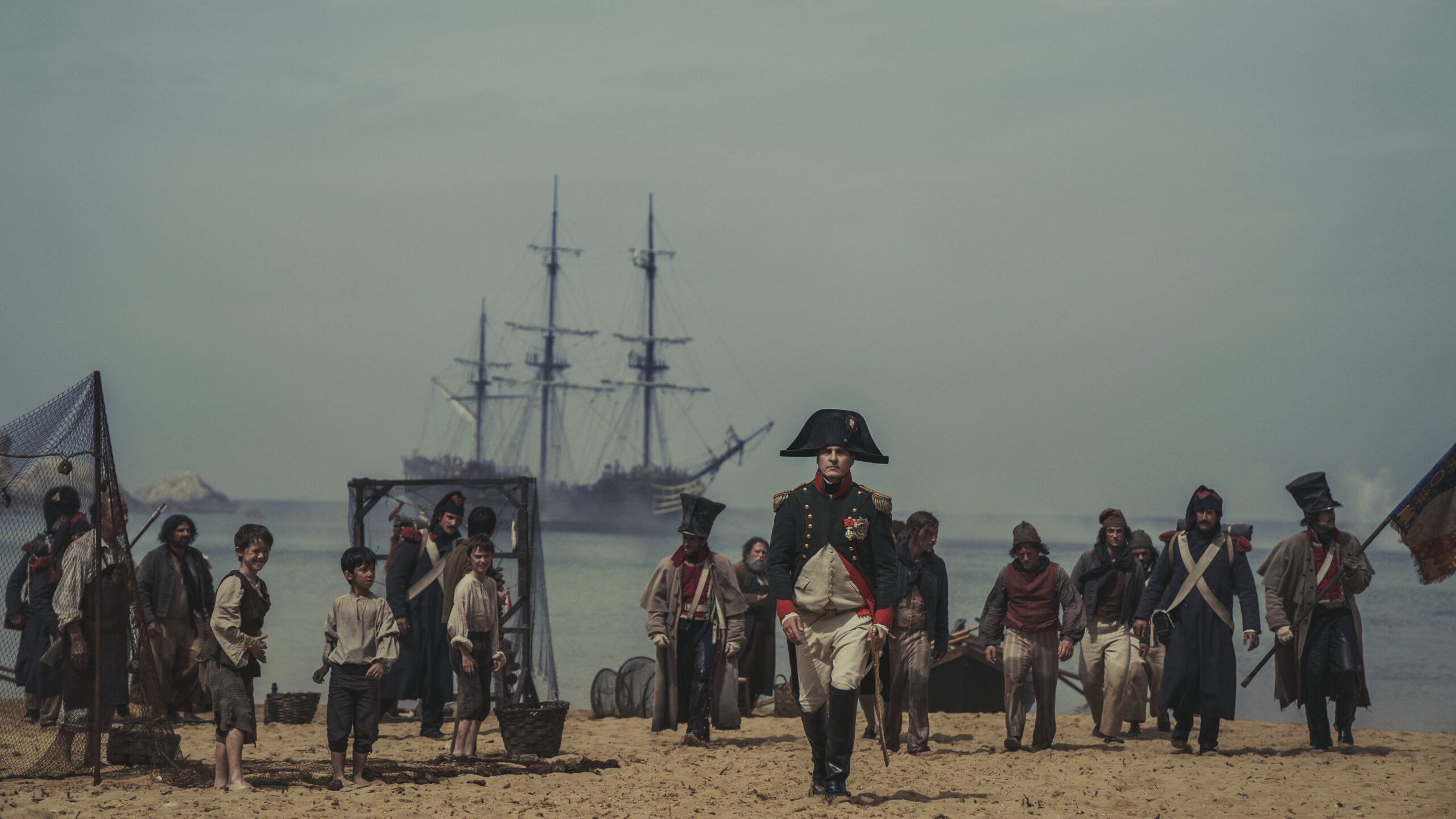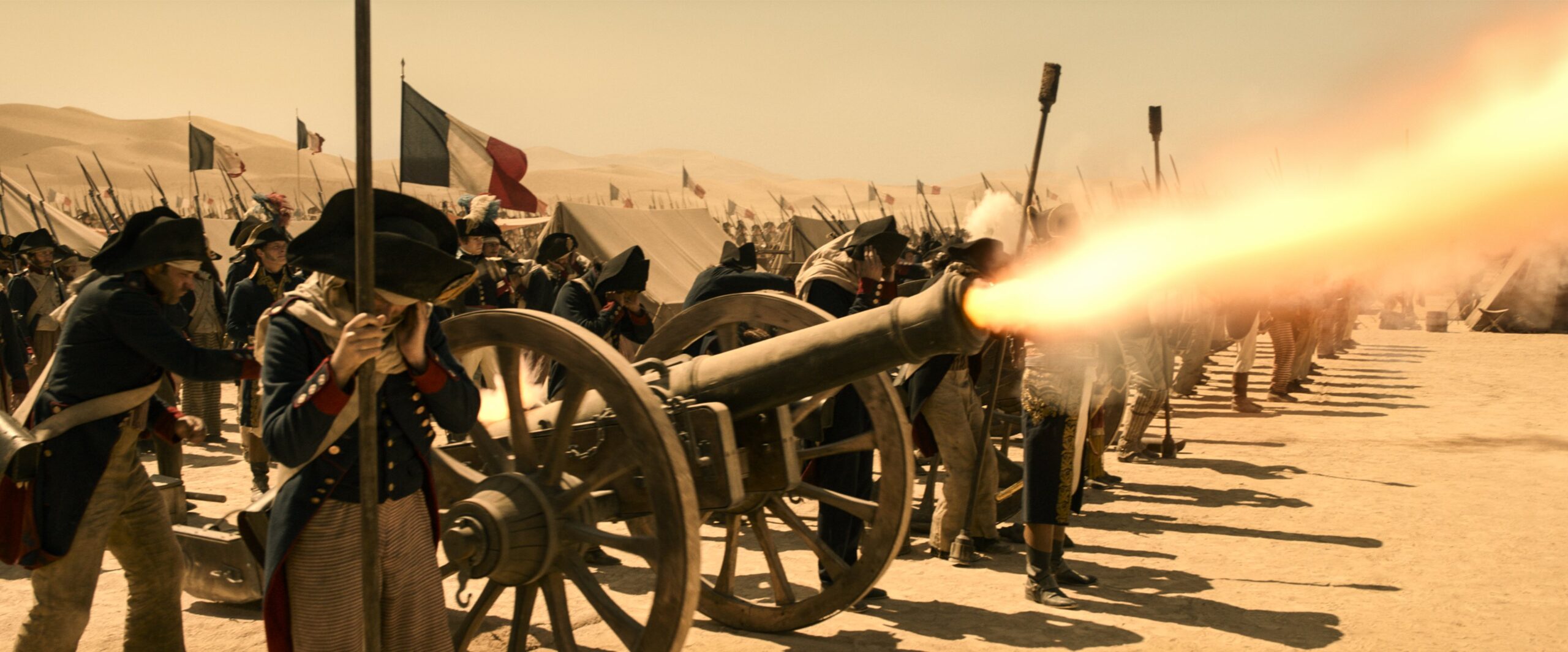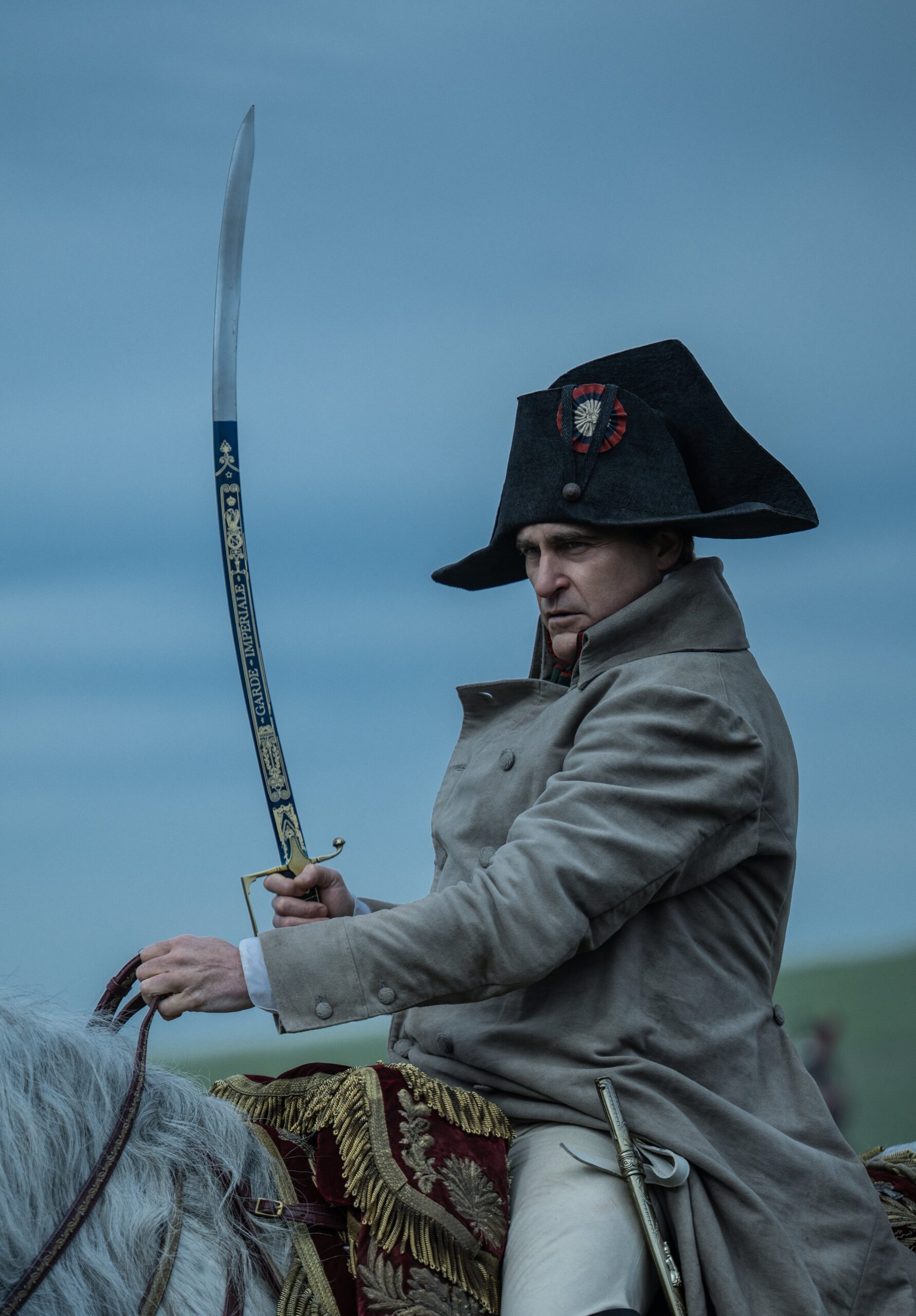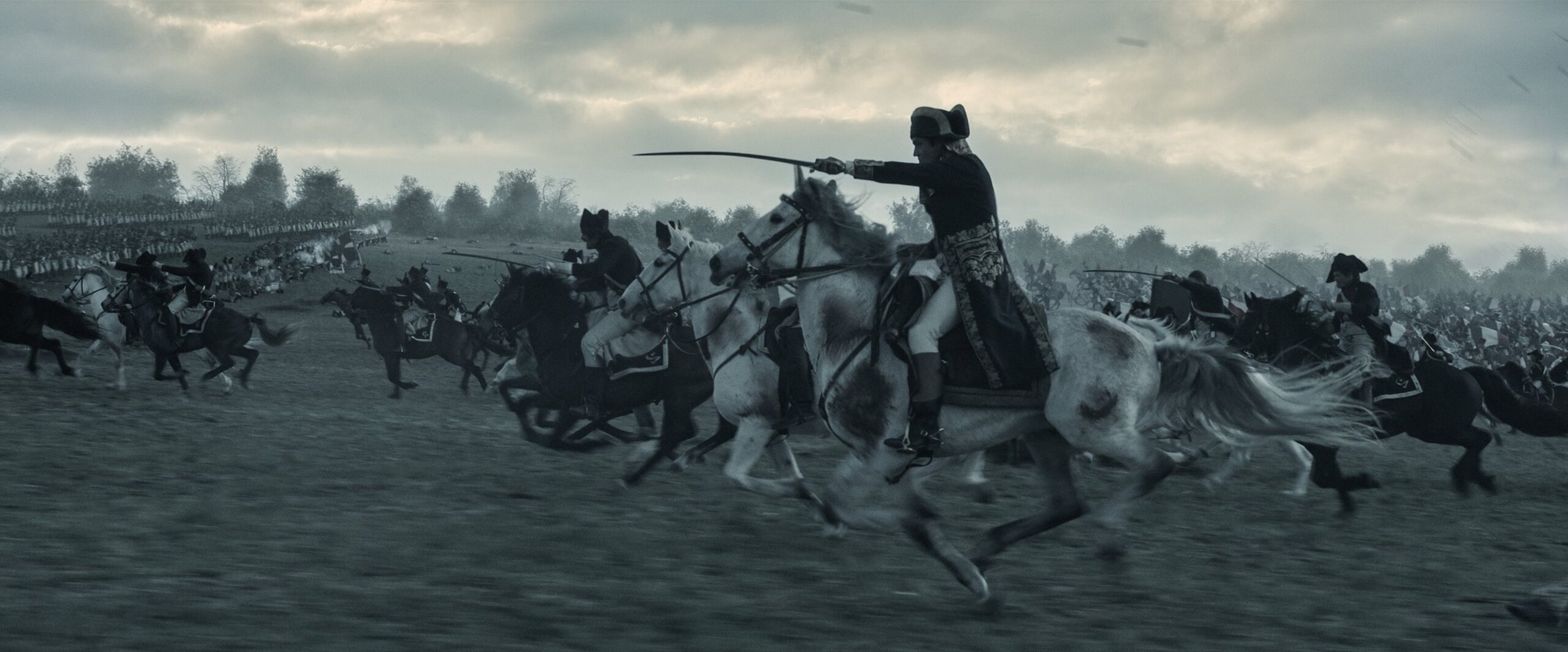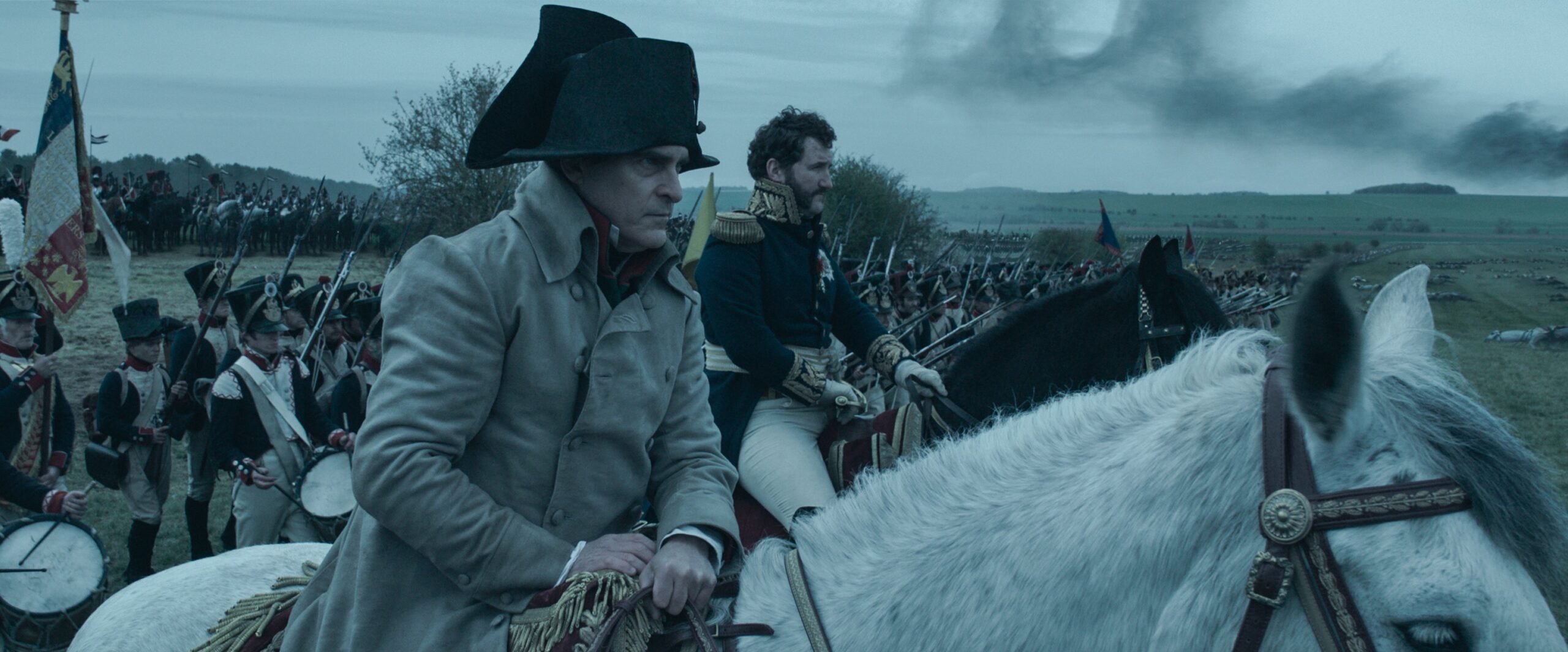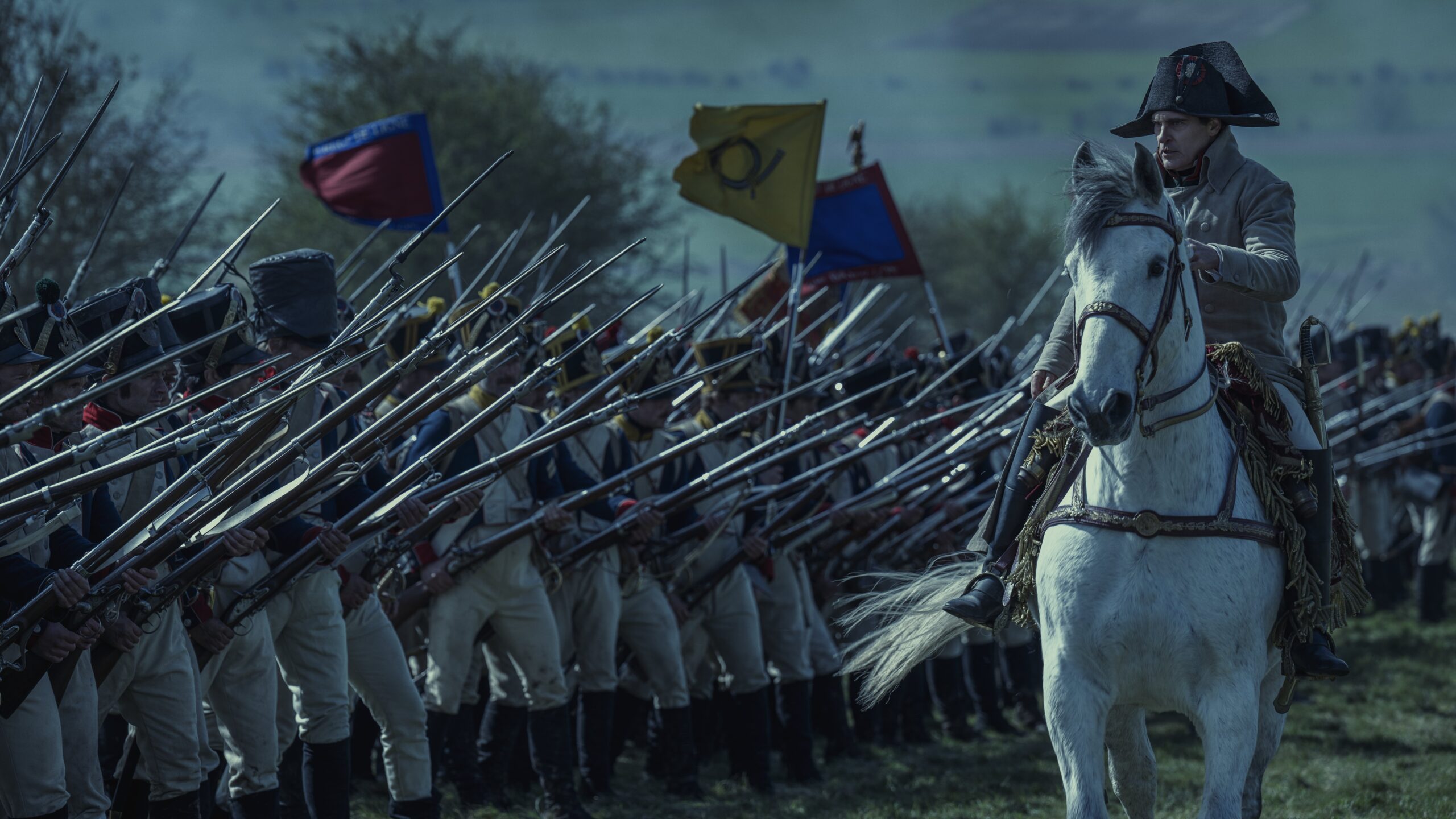NAPOLEON, a film by Ridley Scott
Napoleon is a spectacle-filled action epic that details the checkered rise of the iconic Napoleon Bonaparte, played by Oscar®-winner Joaquin Phoenix. Against a stunning backdrop of large-scale filmmaking orchestrated by legendary director Ridley Scott, the film captures Bonaparte’s relentless journey to power through the prism of his addictive, volatile relationship with his one true love, Josephine, showcasing his visionary military and political tactics against some of the most dynamic practical battle sequences ever filmed.
Columbia Pictures and Apple Original Films present, a Scott Free production, a Ridley Scott film, Napoleon. The film stars Joaquin Phoenix and Vanessa Kirby. Directed by Ridley Scott. Written by David Scarpa. Produced by Ridley Scott, Kevin J. Walsh, Mark Huffam, and Joaquin Phoenix. The executive producers are Raymond Kirk, Aidan Elliott, and Michael Pruss. The director of photography is Dariusz Wolski, ASC. The production designer is Arthur Max. Edited by Claire Simpson and Sam Restivo. The costume designers are Janty Yates and Dave Crossman. Music by Martin Phipps.
Napoleon will be released exclusively in theaters globally on November 22, 2023, before streaming globally on Apple TV+.
A FASCINATING LIFE
One of the greatest military leaders of all time, Napoleon Bonaparte’s fascinating life has evoked both criticism and admiration from scholars, politicians, and his own subjects. Both his rise to power and his harsh and strategic military campaigns are infamous and have influenced the generations that followed, from Winston Churchill to Friedrich Nietzsche.
Ruthless in war, a tyrant in his country, but also a liberator who came from nothing and was one of the first in history to show that leadership talent could come from any class, Napoleon’s success on the battlefield has passed into legend. Such was his tactical brilliance and merciless reputation that the world required seven different coalitions of European powers to defeat him. But off the battlefield, his obsession with Josephine – his lover, his wife, his empress – would define his life as much as any battle.
For Academy Award®-nominated director Ridley Scott (Gladiator, Thelma and Louise, Black Hawk Down), that story – the meteoric rise of a military genius, the chance to show his duality and psychology on an epic scale as few other filmmakers could attempt – is one that he has wanted to bring to the screen for many years.
“I have a preference for historical drama, because history is so interesting,” he says. “Napoleonic history is the beginning of modern history. He changed the world; he rewrote the rulebook.”
But more than that, Napoleon was a singularly fascinating character for a movie, because – like many of us – he was a prisoner to his own heart and emotions.
“Apart from him being an incredible strategist, a marvelous, intuitive – and merciless – politician… I was fascinated with how a man like this – who’s on his way to take Moscow – could be obsessed with what his wife is doing back in Paris.”
Producer Mark Huffam, who has worked on many of Scott’s projects over the years, including House of Gucci, The Martian, and Prometheus, says that Napoleon is a film that requires the vision, tenacity, skill, and experience of Ridley Scott – and that there are few directors who are brave enough to make this kind of film anymore.
“This movie has an epic scale that I don’t think you’ll see many times in the future,” he says. “There just aren’t many directors in the world that have the knowledge and experience to make this kind of film, and doing as practically – in-camera – as possible.”
And who can blame them? Napoleon is, famously, a subject that has intimidated some of history’s greatest directors – notably, Stanley Kubrick, whose famed Napoleon project never came together. Producer Kevin Walsh sees in Scott a desire to pick up where Kubrick left off.
“Kubrick is one of Ridley’s heroes,” he says. “Kubrick tried to make Napoleon, but it never happened, so when I asked Ridley a couple of years ago, ‘What is the film that you haven’t been able to make yet?’ His answer was, ‘Napoleon.’”
Scott’s fascination with the leader and the period dates back to his very beginnings as a film director. His first motion picture, The Duellists, is set in the Napoleonic era. He says that was the film where he saw firsthand how and why audiences would respond to a historical story. “History’s very interesting, because we don’t learn from all of our mistakes,” he says. In that way, says Scott, a historical film covering events two hundred years in the past, filtered through the perspective of the artist, becomes relevant for today.
And as a filmmaker, Scott knows firsthand from experience that he has a responsibility both to history and to art; he creates impressions of subjects that allow them to come alive for audiences.
“About a year after I made Gladiator, I received a letter from a senior lecturer at one of the great universities,” says Scott. “He said, ‘ I want to thank you for bringing the Roman Empire to life.’ It had made his students enthusiastic for the subject.” Scott compares making a historical film to “a mathematical equation – either this could have happened or that could have happened; it comes from research and you make a choice.”
Scott says that he was as attracted to the idea of exploring the psychology of the character of Napoleon as he was with filming the spectacle of his epic battles.
“I think one of the reasons people are still fascinated by Napoleon is because he was so complicated,” he says. “There is no easy way to define his life. You can read a biography to know what happened, but what interests me as a filmmaker is his character – going beyond the history and into the mind.”
“Ridley allows himself some creative license, but it is always grounded in the truth,” says Walsh. “We did a ton of research with historians and our writers, people that really delved into the history to make sure it was authentic.”
To create the epic scale of the movie, Scott reunited with several of his past collaborators, who have worked with him many times over the years. Production designer Arthur Max (an Oscar® nominee for his work on Gladiator and The Martian), costume designer Janty Yates (who won an Oscar® for her work on Gladiator), director of photography Dariusz Wolski (All the Money in the World, Alien: Covenant), and two-time Oscar®-winning special effects coordinator Neil Corbould (Gladiator and five other Scott films) all returned to help Ridley achieve his vision.
You might think that Scott is able to attract these top artists by their desire to work with the great director, but Scott insists it is a two-way street.
“All of these elements are incredibly important,” he says. “I’m grateful to have these great, extremely talented people, who seem to still want to work with me. When I know that these departments are in such capable hands, I can be super-efficient.”
“Ridley is incredibly well-prepared,” says Huffam. “He storyboards all of his films himself, which is a huge advantage to every department. He knows exactly what the finished product will be – cutting the film as we’re going along.’
“Ridley shoots the movie in his head,” says Walsh. “You see him, in any down moment, just planning, and creating. It’s not a job to him; it’s creating art.”
As well as reuniting with his various heads of departments, this film also reunites Scott with Joaquin Phoenix, who previously played Commodus in Gladiator. For Ridley, it was after seeing Joaquin’s Academy Award®-winning performance in Joker that he was reminded of their collaboration on Gladiator, and knew that he would be perfect for the role:
“I saw him and it all came flooding back – how we worked on Gladiator, and what journey he went on with that character, and I thought, ‘God damn, there’s Napoleon.’”
Phoenix says that because Scott’s preparation is so meticulous, it allows his actors freedom to explore the role on set.
With Phoenix on board, it was imperative to find an actress suited to the tenacity and ambitiousness of Josephine. For Scott, casting comes down to “intuition,” he says.
“If you’ve been thinking that a role calls for someone tall and dark-haired, and then somebody short and blonde walks into the room, you think, ‘Ah, that’s interesting.’ You have to be open. Vanessa [Kirby] played the role with confidence and sensuality, but what’s great is her humor. She’s got a great sense of humor and a very natural intuitive sense of timing that set her apart and made an interesting, striking match opposite Joaquin.”
The chemistry between the actors would create a tension and dynamic that, for Scott, would not only bring the characters to life but add volatile layers to Napoleon as he continues his epic quest to become master of Europe. The actors would breathe fire into the tempestuous and unconventional relationship on the page of David Scarpa’s screenplay, revealing Napoleon’s inner demons and an unseen side of history.
Scarpa had previously worked with Scott on All the Money in the World, and the two discussed the key beats of Napoleon’s life and the specific version of the character that attracted them. It was clear from the initial meetings that Ridley saw this movie as an epic action film, but also the love story of Napoleon and Josephine.
“That was the specific story he wanted to investigate: through the prism of the love story of Josephine and Napoleon,” says Walsh. “They have a real push and pull; they’re infatuated with each other and fuel each other, and without each other, they wouldn’t be the same person.”
In every aspect of Napoleon’s life, says Huffam, there are conflicts and dualities. Start just with his legacy as a general and emperor.
“Napoleon did great things for politics and the common man. He made it that anyone could become a general, or a politician, rather than just the aristocracy,” he notes. “But, of course, he was a dictator, and the blood on his hands is horrendous. That balance is something that we wanted to explore when making this film.”
And when Scott tells the story through Napoleon’s relationship with Josephine, he adds dualities upon dualities.
“He ends up sniveling in tears – the man we have seen command his way to the throne of Europe, the tactical genius, turned into this little helpless man, who is completely in love with the woman next to him on his couch, admitting he is nothing without her,” says Scott. “His letters to her are comically rude and juvenile, overly romantic, and even quite dirty. He was absolutely enchanted by her. And after they parted for the last time, she never even read them. When she died, they were all in a drawer by her bedside table.”
#Napoleon
Press release from Sony Pictures, Cristiana Caimmi.

